Prajakta Hushangabadkar
In winter season we sight a few uncommon birds around us -Black-Red Start, green bee eater ,ashy crown sparrow, lark and water birds like wagtail, Bar headed Goose,Comb Duck, Black
Stork, Demoiselle Crane, Common Crane, Spot bill duck,Mallard, Shoveller, Red crested Pochard,Common Pochard, Cotton teal ,Gulls, Pintail, Spoonbill, and many more. Thesebirds are not seen throughout the year as they come from different parts of the world
like Russia, Mongolia, or they do migrate from within country from high altitude area like Leh - Ladakh . The best place to see the migratory water birds is certain water bodies and grassland near to the riverine areas. Ducks and geese come in large flocks.There
are certain places close to Amravati where avian friends do visit in winter every year and it’s a feast for birders to observe the activity of migratory birds.
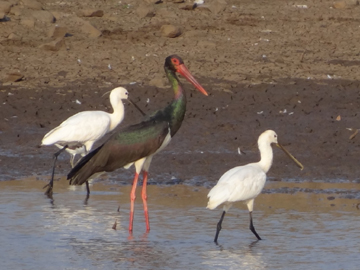
Black Stork
This year also the beautifulwinter visitors have arrived; few of them are local winter migratory like wagtail and ruddy shelduck. Ruddy shelduck do breed in Ladakh . Few others
have come from across Russia and Mongolia, for example, bar headedgeese do come from Mongolia. Researchstudy on migratory birds shows some amazing facts, bar headed geese (“raajhans“in Marathi) come from Mongolia. They were first sighted in 2009 by Mr.TarunBalpande
near to Nagpur. Bar headed geese had been collared in Mongoliato understand the migration of these species by the WildlifeConservation Society of Mongolia –by a team led by Martin Gilbert. Theycollared adult females with yellow collard “NU”. These yellow
collared bar headed geese adult femaleswere first sighted by the team of Mr.Tarun Balpande . They sighted this same adult female withcollar every year on the same place of first sighting. This is the fourth year when they sighted thisfemale at same place.
It almost covers 4800 km distance to reach this placefrom Mongolia . It shows that migratorybirds can visit same place for manyyears regularly.
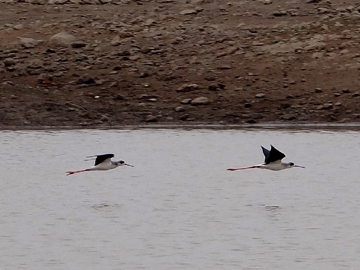
Black winged Stilts
Bird migration still remains a mystery,there are so many amazing facts related to migration of birds. Just before the migration, birds start deposition of fat in their body. When this fat reaches to certain level , birds begins to migrate, this phase
is called zugunrunhe in biological term. Ducks do fly in “v” shape formation to save energy. They use some flying zones as they know where to migrate, when to migrate, how to migrate. Few of them cross Himalayas as well. Global warming also affect the
numbers of migratory visitors. This year the birds reached Amravati a little late .
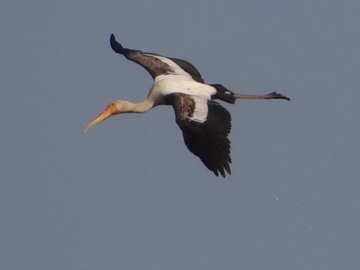
Painted Stork
Water bodies and surroundinghabitat is lifeline for this birds. Itis sad that they are being polluted due to many reasons. Not only water bodies but surrounding habitatgrassland,
marsh etc, are being affected. All migratory water birds are not dependent on water bodies for their food, few of themalso feed on grass seeds, insects etc.there are any number of reasons responsible for the destruction of theirnatural habitat viz. Fishing,
idol immersion during durga puja and ganeshpujan, illegal grazing on grassland nearer to riverine areas are some ofthem. Also Poisonous traps used for fishing and hunting.
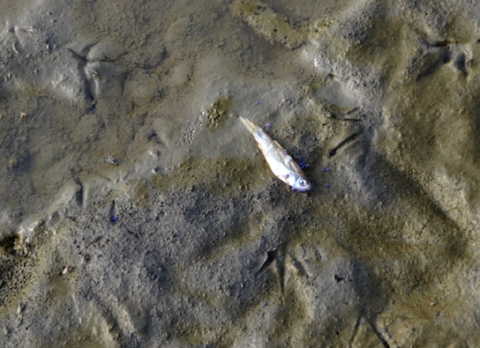
Poison crystals and a dead fish
We just sighted poisonous trap at a lake near to Amravati, we saw some fish covered with the poisonous crystals; we collected all the dead fish we could find, but unknowingly few
of them were left and one great egret died due to eating poisoned fish. We again saw net bird traps near to same lake after few days. There is need to protect certain places by forest department. Disturbance by the so called nature lover, tourist who often
visit those places for entertainment and throw garbage and waste in to water bodies, also needs to be mentioned here.
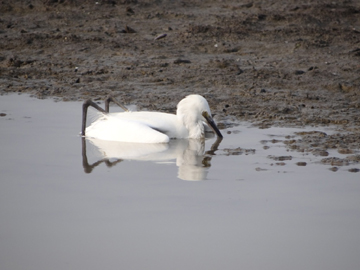
Dead egret
Due to loss of habitat, pink headed duck become extinct. ThePink-headed Duck (Rhodonessacaryophyllacea) that was once foundi n parts of the Gangetic plains of India,
Bangladesh and in the riverine swamps of Myanmar is feared to have gone extinct since the 1950s. Numerous searches have failed to provide any proof of continued existence. It has been suggested that it may have happened due to continuous destruction of
habitat. It also suggests the need for conservation of water birds species.
The Migration of birds to a certain place signifies the health of the habitat and it improves the richness i biodiversity too. For the c onservation of biodiversity of this area we
need to pay attention to the conservation of these water bodies. After that we have very common quote in Hindi“ atithi devo bhav “ which means “try to give comfort to guests”-please include your avian guests too in the term. We wish these beautiful avian
friends do visit us every year and make that habitat more graceful with their presence.
(Text and photographs by Prajakta Hushangabadkar)